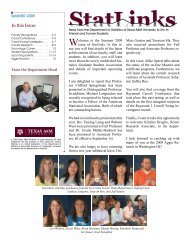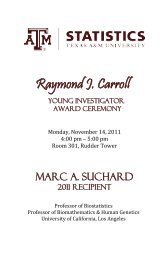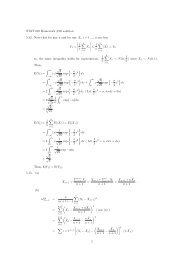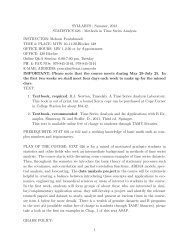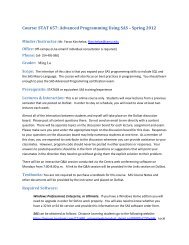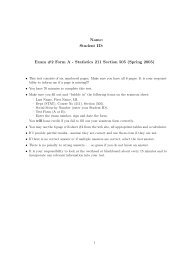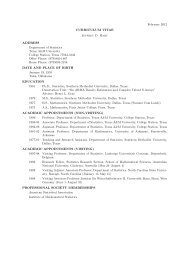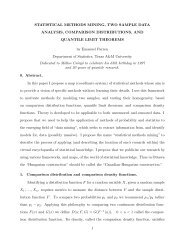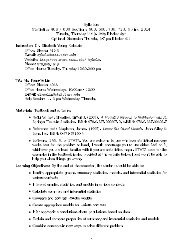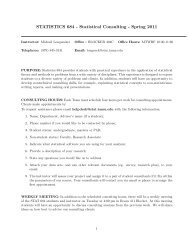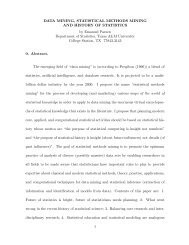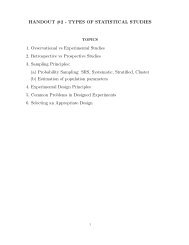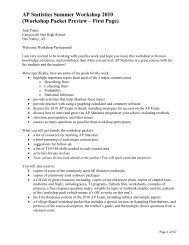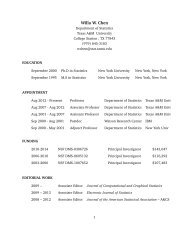SYLLABUS - Texas A&M University
SYLLABUS - Texas A&M University
SYLLABUS - Texas A&M University
You also want an ePaper? Increase the reach of your titles
YUMPU automatically turns print PDFs into web optimized ePapers that Google loves.
<strong>SYLLABUS</strong> : Spring, 2010<br />
STATISTICS 689 : Missing Data in Longitudinal Studies<br />
INSTRUCTOR: Dr. Mohsen Pourahmadi<br />
OFFICE HOURS: TuTh 1-1:50 or by Appointment<br />
OFFICE: 439 Blocker<br />
PH. & FAX NOs: 979-845-3164, 979-845-3144<br />
E-MAIL ADDRESS: pourahm@stat.tamu.edu<br />
TEXT:<br />
1. (Required) Missing Data in Longitudinal Studies: Strategies for Bayesian Modeling<br />
and Sensitivity Analysis. M.J. Daniels and J.W. Hogan ( 2008),Chapman &Hall/CRC<br />
Press.<br />
2. (Recommended) Data Analysis Using Regression and Multilevel/Hierarchical Models.<br />
A. Gelman and J. Hill (2008), Cambridge Press.<br />
3. (Recommended) Mixed Effects Models for Complex Data. Lang Wu (2009), Chapman<br />
& Hall /CRC Press.<br />
4. (Recommended) Antedependence Models for Longitudinal Data. D. Zimmerman and<br />
V. Nunez-Anton, Chapman & Hall/CRC Press.<br />
5. (Recommended) Longitudinal Data Analysis. G. Fitzmaurice, M. Davidian, G. Verbeke,<br />
G. Molenberghs (2008) CRC Press.<br />
PREREQUISITE: Equivalent of STAT 636 and STAT 612 OR Approval of the Instructor.<br />
FOCUS OF THE COURSE: STAT 689 is intended for a mixed of motivated graduate students<br />
in statistics and other fields who need a solid introduction to the theory and methods<br />
of longitudinal (repeated measures, panel,) data analysis with a focus on handling the difficult<br />
and prevalent problem of missing data. After reviewing some background material<br />
on regression models or generalized linear models( GLMs) with correlated response, and<br />
introducing the basic principles of longitudinal studies and methods of analysis, we discuss<br />
applications to biomedical sciences and social sciences or areas of interest to students in the<br />
course. Modeling dependence and covariance matrix of longitudinal data and their impacts<br />
on handling missing data will be discussed. Early in the semester, students will be divided<br />
into smaller groups who are interested in similar application areas, they will be assigned a<br />
project and relevant research papers and datasets to study, analyze and present at various<br />
times in the course. In addition to the textbook, we shall rely extensively on research<br />
papers published in the last decade or so, most of which are reviewed and summarized in<br />
1
the recommended texts.<br />
GRADING POLICY:<br />
1. Only one midterm exam worth 100 points will be given in class. There is no final<br />
examination.<br />
2. Homework will be assigned regularly and posted on DoStat (Reference and Registration<br />
codes are : DS-297 and LDA), it will contribute 50 points to the course. The<br />
quality of writing and logical presentation of the arguments leading to a result, not<br />
just the correct answer, will contribute greatly to the grade for this part of the course.<br />
Attendance and classroom participation are encouraged and will be rewarded, they<br />
are integral parts of the learning process .<br />
3. Project in the course will involve a significant amount of reading the relevant literature<br />
in the student’s area of interest, computational effort, discussion and presentation in<br />
the class. This is worth 150 points. The final project report should be organized and<br />
typed following the format of a research article in statistics. The quality of writing<br />
and presentation in class will contribute greatly to the grade for this part of the<br />
course.<br />
4. The final course grade will be based on the standard scale where a total of 90 to 100<br />
percent will be an A, 80 to 89 percent will be a B, etc.<br />
5. ACADEMIC INTEGRITY STATEMENT: ”An Aggie does not lie, cheat, or steal or<br />
tolerate those who do.” The Aggie Honor Council Rules and Procedures are available<br />
at http://www.tamu.edu/aggiehonor.<br />
6. STATEMENT ON PLAGIARISM: As commonly defined, plagiarism consists of passing<br />
off as one’s own ideas, words, writing, etc., which belong to another. In accordance<br />
with this definition, you are committing plagiarism if you copy the work of another<br />
person and turn it in as your own, even if you should have the permission of that<br />
person. Plagiarism is one of the worst academic sins, for the plagiarist destroys the<br />
trust among colleagues without which research cannot be safely communicated. If<br />
you have any questions regarding plagiarism, please consult the latest issue of the<br />
<strong>Texas</strong> A&M <strong>University</strong> Student Rules, under the section ”Scholastic Dishonesty.”<br />
7. STATEMENT ON DISABILITIES: The Americans with Disabilities Act (ADA) is a<br />
federal anti-discrimination statute that provides comprehensive civil rights protection<br />
for persons with disabilities. Among other things, this legislation requires that all<br />
students with disabilities be guaranteed a learning environment that provides for<br />
reasonable accommodation for their disabilities. If you believe you have a disability<br />
requiring an accommodation, please contact the Office of Disability Services in Room<br />
B118 of Cain Hall. The phone number is 845-1637.<br />
2



